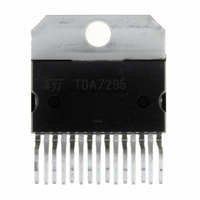TDA7295 STMicroelectronics, TDA7295 Datasheet - Page 8

TDA7295
Manufacturer Part Number
TDA7295
Description
IC AMP AUDIO 80W AB MULTIWATT15
Manufacturer
STMicroelectronics
Type
Class ABr
Datasheet
1.TDA7295.pdf
(13 pages)
Specifications of TDA7295
Output Type
1-Channel (Mono)
Max Output Power X Channels @ Load
80W x 1 @ 8 Ohm
Voltage - Supply
±10 V ~ 40 V
Features
Depop, Mute, Short-Circuit and Thermal Protection, Standby
Mounting Type
Through Hole
Package / Case
Multiwatt-15 (Vertical, Bent and Staggered Leads)
Amplifier Class
AB
No. Of Channels
1
Output Power
80W
Supply Voltage Range
± 10V To ± 40V
Thd + N
0.005% @ 5W, 8ohm, VS = ± 30V
Load Impedance
8ohm
Operating Temperature Range
0°C To +70°C
Rohs Compliant
Yes
Lead Free Status / RoHS Status
Lead free / RoHS Compliant
Other names
497-3965-5
Available stocks
Company
Part Number
Manufacturer
Quantity
Price
Company:
Part Number:
TDA7295
Manufacturer:
NXP
Quantity:
2 000
Part Number:
TDA7295
Manufacturer:
ST
Quantity:
20 000
Part Number:
TDA7295S
Manufacturer:
ST
Quantity:
20 000
TDA7295
INTRODUCTION
In consumer electronics, an increasing demand
has arisen for very high power monolithic audio
amplifiers able to match, with a low cost the per-
formance obtained from the best discrete de-
signs.
The task of realizing this linear integrated circuit
in conventional bipolar technology is made ex-
tremely difficult by the occurence of 2nd break-
down phenomenon. It limits the safe operating
area (SOA) of the power devices, and as a con-
sequence, the maximum attainable output power,
especially in presence of highly reactive loads.
Moreover, full exploitation of the SOA translates
into a substantial increase in circuit and layout
complexity due to the need for sophisticated pro-
tection circuits.
To overcome these substantial drawbacks, the
use of power MOS devices, which are immune
from secondary breakdown is highly desirable.
The device described has therefore been devel-
oped in a mixed bipolar-MOS high voltage tech-
nology called BCD 100.
1) Output Stage
The main design task one is confronted with while
developing an integrated circuit as a power op-
erational amplifier, independently of the technol-
ogy used, is that of realising the output stage.
The solution shown as a principle schematic by
Fig 15 represents the DMOS unity-gain output
buffer of the TDA7295.
This large-signal, high-power buffer must be ca-
pable of handling extremely high current and volt-
age levels while maintaining acceptably low har-
Figure 15: Principle Schematic of a DMOS unity-gain buffer.
8/13
monic distortion and good behaviour over fre-
quency response; moreover, an accurate control
of quiescent current is required.
A local linearizing feedback, provided by differen-
tial amplifier A, is used to fullfil the above require-
ments, allowing a simple and effective quiescent
current setting.
Proper biasing of the power output transistors
alone is however not enough to guarantee the ab-
sence of crossover distortion.
While a linearization of the DC transfer charac-
teristic of the stage is obtained, the dynamic be-
haviour of the system must be taken into account.
A significant aid in keeping the distortion contrib-
uted by the final stage as low as possible is pro-
vided by the compensation scheme, which ex-
ploits the direct connection of the Miller capacitor
at the amplifier’s output to introduce a local AC
feedback path enclosing the output stage itself.
2) Protections
In designing a power IC, particular attention must
be reserved to the circuits devoted to protection
of the device from short circuit or overload condi-
tions.
Due to the absence of the 2nd breakdown phe-
nomenon, the SOA of the power DMOS transis-
tors is delimited only by a maximum dissipation
curve dependent on the duration of the applied
stimulus.
In order to fully exploit the capabilities of the
power transistors, the protection scheme imple-
mented in this device combines a conventional
SOA protection circuit with a novel local tempera-
ture sensing technique which " dynamically" con-
trols the maximum dissipation.













